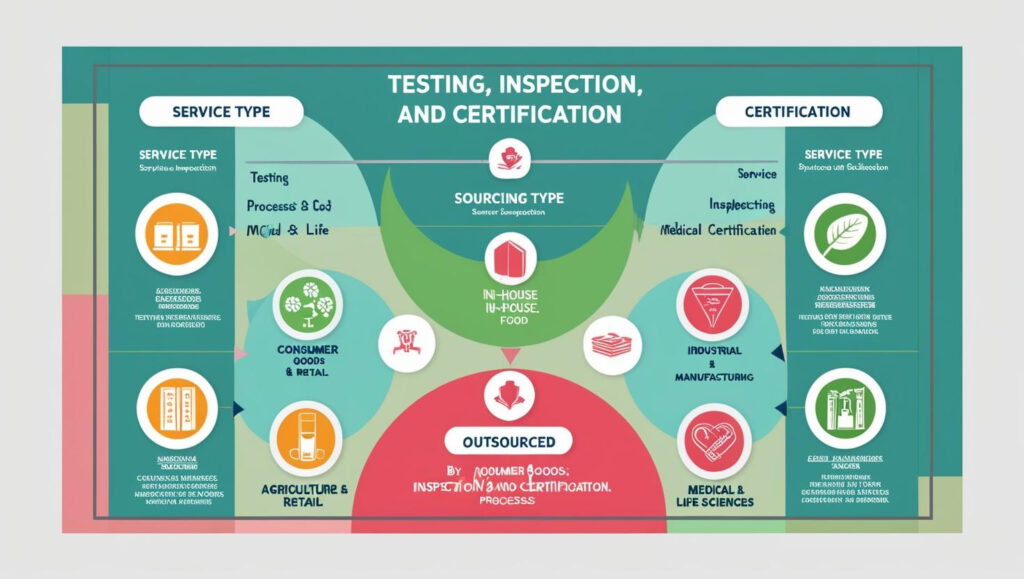The global Testing, Inspection, and Certification (TIC) market is undergoing significant transformation as industries increasingly prioritize quality assurance, regulatory compliance, and risk management. From technological advancements to evolving regulatory frameworks, the TIC industry is adapting to meet the demands of a dynamic global landscape. This article explores the key trends, challenges, and opportunities shaping the future of the TIC market.
Download PDF Brochure @ https://www.marketsandmarkets.com/pdfdownloadNew.asp?id=5352498

Key Trends Shaping the TIC Market
1. Digital Transformation and Automation
The adoption of digital technologies is revolutionizing the TIC industry. Advanced technologies such as Artificial Intelligence (AI), Machine Learning (ML), blockchain, and the Internet of Things (IoT) are enhancing the efficiency and accuracy of testing, inspection, and certification processes. For example, AI-powered predictive analytics can identify potential issues before they occur, reducing downtime and improving operational efficiency.
Automation is also gaining traction in the TIC industry, with drones and robotics being used for remote inspections in sectors such as construction, oil and gas, and renewable energy. These innovations not only improve safety but also reduce costs and time required for inspections.
2. Increased Focus on Sustainability
As environmental concerns grow, industries are placing greater emphasis on sustainable practices. The TIC market is playing a critical role in verifying compliance with environmental regulations and standards. From renewable energy systems to sustainable manufacturing processes, TIC services are essential for companies aiming to reduce their environmental impact and meet global sustainability goals.
3. Globalization and Supply Chain Complexity
Globalization has led to more complex supply chains, increasing the need for rigorous testing, inspection, and certification to ensure quality and compliance. As products and services cross borders, companies must adhere to international standards and regulations, driving demand for TIC services.
4. Rising Demand in Emerging Markets
Emerging economies in Asia-Pacific, Latin America, and the Middle East are experiencing rapid industrialization and urbanization. This growth has created new opportunities for the TIC market, particularly in sectors such as manufacturing, construction, and healthcare. Countries like China and India are becoming significant players in the global TIC industry due to their expanding industrial bases and adoption of international standards.
Challenges Facing the TIC Industry
1. Regulatory Fragmentation
One of the primary challenges in the TIC market is the fragmentation of regulations across different regions. Companies must navigate a complex web of local, national, and international standards, which can be time-consuming and costly. Harmonizing these regulations remains a significant challenge for the industry.
2. Talent Shortages
As the TIC industry grows, the demand for skilled professionals is increasing. However, there is a shortage of qualified personnel with expertise in advanced technologies and regulatory compliance. Addressing this talent gap is crucial for the industry to maintain its growth trajectory.
3. Cybersecurity Risks
With the integration of digital technologies, the TIC industry is increasingly vulnerable to cybersecurity threats. Protecting sensitive data and ensuring the integrity of digital systems is a critical concern for companies operating in this space.
Opportunities in the TIC Market
1. Expansion into New Sectors
The TIC market has the potential to expand into emerging sectors such as electric vehicles (EVs), autonomous driving, and smart cities. These industries require specialized testing, inspection, and certification services to ensure safety and performance, presenting significant growth opportunities.
2. Partnerships and Collaborations
Collaborations between TIC companies, technology providers, and industry stakeholders can drive innovation and expand service offerings. For instance, partnerships with tech firms can facilitate the development of advanced inspection tools and systems.
3. Growth of Remote and Virtual Services
The COVID-19 pandemic accelerated the adoption of remote and virtual TIC services. These solutions offer flexibility and cost savings while maintaining the quality and accuracy of inspections. The continued growth of remote TIC services presents a lucrative opportunity for the industry.
The global Testing, Inspection, and Certification market is at a pivotal juncture, shaped by emerging trends, technological advancements, and evolving industry demands. While challenges such as regulatory fragmentation and talent shortages persist, the industry is well-positioned to seize new opportunities in sectors like EVs, renewable energy, and smart cities. By embracing innovation and addressing key challenges, the TIC market can continue to play a vital role in ensuring quality, safety, and compliance across industries.
